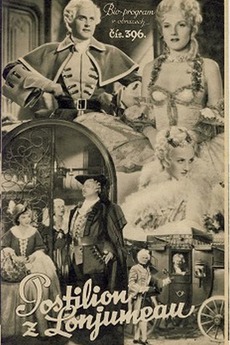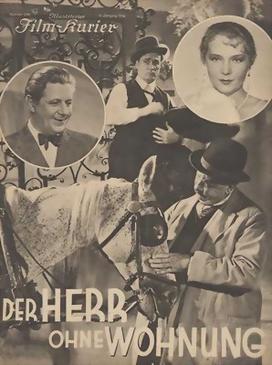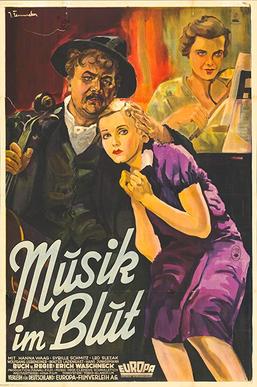
Hans Moser was an Austrian actor who, during his long career, from the 1920s up to his death, mainly played in comedy films. He was particularly associated with the genre of the Wiener Film. Moser appeared in over 150 films.

Heinrich Wilhelm "Heinz" Rühmann was a German film actor who appeared in over 100 films between 1926 and 1993. He is one of the most famous and popular German actors of the 20th century, and is considered a German film legend. Rühmann is best known for playing the part of a comic ordinary citizen in film comedies such as Three from the Filling Station and The Punch Bowl. During his later years, he was also a respected character actor in films such as The Captain from Köpenick and It Happened in Broad Daylight. His only English-speaking movie was the 1965 Ship of Fools.

Leo Slezak was an Austrian dramatic tenor. He was associated in particular with Austrian opera as well as the title role in Verdi's Otello. He is the father of actors Walter Slezak and Margarete Slezak and grandfather of the actress Erika Slezak.
E. W. Emo was an Austrian film director.
Julius von Borsody was an Austrian film architect and one of the most employed set designers in the Austrian and German cinemas of the late silent and early sound film periods. His younger brother, Eduard von Borsody, was a film director in Austria and Germany. He is also the great-uncle of German actress Suzanne von Borsody.
Der Herr im Haus is a 1940 German film directed by Heinz Helbig.

The Postman from Longjumeau is a 1936 Austrian-Swiss musical comedy film directed by Carl Lamac and starring Carl Esmond, Rose Stradner and Alfred Neugebauer. The film is known by several alternative titles including Der König lächelt – Paris lacht. It is loosely based on the 1836 opera Le postillon de Lonjumeau by Adolphe Adam. In eighteenth-century France, a Postilion from Longjumeau is summoned by Madame de Pompadour to sing in her opera company, forcing him to be separated from his wife.
Moser is a South German topographic surname. Notable people with the surname include:

Operetta is a 1940 German musical film directed by Willi Forst and starring Forst, Maria Holst and Dora Komar. The film was made by Wien-Film, a Vienna-based company set up after Austria had been incorporated into Greater Germany following the 1938 Anschluss. It is the first film in director Willi Forst's "Viennese Trilogy" followed by Vienna Blood (1942) and Viennese Girls (1945). The film portrays the life of Franz Jauner (1832–1900), a leading musical figure in the city. It is both an operetta film and a Wiener Film.

Grand Duchess Alexandra is a 1933 Austrian operetta film directed by Wilhelm Thiele and starring Maria Jeritza, Paul Hartmann and Leo Slezak. It is based on Franz Lehár's operetta of the same title.

The Ladies Diplomat is a 1932 German comedy film directed by E. W. Emo and starring Mártha Eggerth, Max Hansen, and Leo Slezak. It was remade in Britain in 1934 as The Diplomatic Lover.

The World's in Love is a 1935 Austrian comedy film directed by Viktor Tourjansky and starring Mártha Eggerth, Leo Slezak and Ida Wüst. It is based on the operetta Clo-Clo. The film's sets were designed by the art director Julius von Borsody. It was remade in Britain the following year as Dreams Come True.

The Gentleman Without a Residence is a 1934 Austrian comedy film directed by E. W. Emo and starring Paul Hörbiger, Hilde von Stolz, and Hermann Thimig. The film's sets were designed by the art director Julius von Borsody.

Roses in Tyrol is a 1940 German musical comedy film directed by Géza von Bolváry and starring Hans Moser, Marte Harell, and Johannes Heesters. It is based on the 1891 operetta The Bird Seller by Carl Zeller, which has been turned into several films.

Men Are That Way is a 1939 German drama film directed by Arthur Maria Rabenalt and starring Hertha Feiler, Hans Söhnker and Hans Olden. The film's sets were designed by the art director Willi Herrmann. It was remade by Rabenalt in Austria as Arena of Fear (1959).

Tonelli is a 1943 German drama film directed by Victor Tourjansky and starring Ferdinand Marian, Winnie Markus and Mady Rahl. It was shot at the Bavaria Studios in Munich and at the Deutsches Theater in the city. The film's sets were designed by the art director Ludwig Reiber. It is a circus film, a popular genre in Germany during the war years.

Tales from the Vienna Woods is a 1934 Austrian musical film directed by Georg Jacoby and starring Magda Schneider, Wolf Albach-Retty and Leo Slezak. The title refers to the waltz Tales from the Vienna Woods by Johann Strauss.

Music in the Blood is a 1934 German drama film directed by Erich Waschneck and starring Leo Slezak, Hanna Waag and Sybille Schmitz. Location shooting took place in Dresden.

The Man Who Couldn't Say No is a 1938 German romantic comedy film directed by Mario Camerini and starring Karl Ludwig Diehl, Karin Hardt, and Leo Slezak. It is a remake of the 1936 Italian film But It's Nothing Serious also directed by Camerini. It was shot at the Halensee Studios in Berlin. The film's sets were designed by the art directors Gabriel Pellon and Heinrich Richter.

Shame on You, Brigitte! is a 1952 Austrian comedy film directed by E.W. Emo and starring Heinz Rühmann, Hans Moser and Theo Lingen. It was later released in West Germany under the alternative title Wir werden das Kind schon schaukeln. It is based on the play Bubusch, a German-language version of a work by Hungarian writer Gábor Vaszary, which had previously been adapted into the 1943 German film Geliebter Schatz.
















